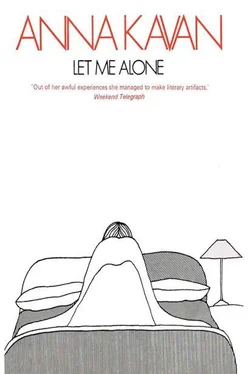‘Is it possible that you are Anna?’ she cried in exaggerated, smiling astonishment, when she first saw her.
‘Yes,’ said Anna, with her air of quiet composure that was so unchildlike.
She shook hands gravely with her aunt, and stood as if waiting, her grey eyes steady and changeless. She was tall for her age and looked a year or two older.
‘But why are you dressed like that?’ Lauretta cried, plaintively, amazedly.
She was laughing and feigning horror, but the horror was not altogether feigned, and Anna knew it. She began to smile.
‘These are the only clothes I have,’ she answered.
Lauretta gave a shrill little cry as if something had hurt her.
‘My dear child! How too terrible! she exclaimed in exaggerated dismay, still laughing, but genuinely shocked.
She put her hands on Anna’s thin shoulders and held her rigid, looking at her, examining her with a slight, delicate, patronizing insolence.
‘She looks just like a peasant boy,’ she said to herself in real disapproval. But immediately she realized that it was not true; that comely, well-shaped face was most un-peasantlike; there was nothing of the yokel in the fineness of that slender body.
‘A Greek shepherd-boy is nearer the mark,’ she thought. ‘An Arcadian shepherd-lad.’ And for a moment her romanticism, her faculty of seeing everything in terms of romance, almost carried her away. Just for one moment she saw Anna as a romantic figure, caught a glimpse of something strange and rather charming about her. But then her practical worldliness came back and took the upper hand. Romance in the abstract was all very well; but in one’s own family, in one’s own sister’s child, something more conventional was to be desired. She became definitely the disapproving superior; the condescending but critical great-lady who finds the state of affairs prevailing among her inferiors very far from her liking. It was in Lauretta’s nature to be a sort of exacting Lady Bountiful.
Anna stood quietly, submitting to the critical, disapproving regard, with her slim brown hands that were even more delicate than Lauretta’s, hanging at her sides. She flushed slightly, resenting the criticism and the patronage. The quick blood rose under the clear, warm-cream skin, a bright light, like enmity, leapt into the grey-veiled eyes. The instinctive blood-recoil from an opposing — nature.
It was hot and airless in the house, so they went and sat at the edge of the chestnut-wood where there was a breeze blowing. Anna built a seat for Lauretta among the rocks, cushioning it with grass and the soft, greyish, fibrous moss from the stones. The sunshine, the wonderful, pure, rich mountain sunshine, like a flood of liquid gold, was pouring down upon the world. The wood was all in motion, restless and uneasy, the green leaves lifting and dipping and weaving in a watery way, so that an ocean of green wavelets seemed to have blown inland.
Lauretta sat on the rock in her flowery dress that was so unmistakably, elegantly expensive, and talked to her niece. She was trying very hard to be charming and winsome and sympathetic to the queer, uncommunicative child.
Anna was reserved and rather distant; she could not help being a little nervous with this sophisticated, elegant, unfamiliar woman, this visitor from another world. Nervous and perhaps a little envious as well. She was proud; she did not want to envy. But she could not shut herself off from the strange, other-world fascination of experienced, assertive perfection that Lauretta possessed: that and the hidden, implacable authority that lurked all the time behind her winning, smiling manner. She made Anna feel clumsy and constrained; and Anna was quite aware that in spite of all her charming kindliness she intended it to be so. Lauretta was very consciously the superior, putting Anna in her humble place with a cunning technique of apparent friendliness.
‘She despises me,’ thought Anna, ‘because I’m not beautifully dressed and because I don’t live in the same way as she does.’
She felt hurt and resentful. At one moment she envied Lauretta; the next she disliked her.
She became silent. The occasional words fell with difficulty from her lips. Her bright, steady, steel-cold eyes never altered. She maintained a sort of steely blankness towards Lauretta, the inevitable enemy.
It made Lauretta angry. She was definitely repelled, this time, by her niece. The tall, quiet, boyish, unchildlike little female with her cold, impersonal grey eyes was really repulsive to her. She could not bear the temperate, almost inhuman steadiness of those grey-blue eyes. And she couldn’t bear the self-contained reserve of the strange girl, resisting her own charming advances. She went away in anger.
Anna’s mind was troubled by the visit. Was she missing something? she asked herself. Wasn’t there, perhaps, something admirable and amusing about the life of the world, the life from which she was completely cut off? And wasn’t something lacking in herself?
James Forrester returned at twilight when the small wild lupins in the grass glimmered white and ghostly like miniature turrets of phosphorescence.
‘A pleasant afternoon?’ he said to his daughter, smiling.
And for a moment on both faces, the grey, grim, haughty face of the man, and the brooding, pale-dark face of the child, the same smile rested, the secret, inward smile of understanding which came from the blood, glamorous.
‘I don’t think my aunt liked me very much,’ said Anna, smiling upwards, a bit cunning in the dusk. ‘She tried to make me feel ashamed of myself.’
‘And did she succeed?’ he asked.
‘No!’ Anna said loyally, and her eyes flashed.
But the father knew that she did not speak the truth.
Anna could not have told when it began; when first she was aware that something new and rather sinister had crept into her relations with her father: a new element. The element of fear. Perhaps it had started on the day of the shooting, when she had stood with her back to the goat-shed in the voluptuous yellow glare of the sunset. Or perhaps it had been born long before, with its thin roots like black worms twisted into the far distant past. But somehow fear had risen. And now its ugly, flat, dangerous head was always rearing up at her out of the bland innocuousness of everyday, as the venomous little vipers would suddenly poke up, hissing, from the sun-warmed rocks.
It was lonely at Mascarat, and the wind came swooping down from the mountains, making wild, maritime noises in the chestnut-forest, shuddering and whining through the draughty old house. Anna had never realized till now the isolation, the complete, black isolation that shut her up alone with her father, absolutely, like the banging of a trap-door. Particularly at night.
By nine o’clock Seguela and Paul would have vanished into their black hole. When there was no wind the house was silent, curiously, stonily silent, as if dead. And Anna, lying on her bed in the dark, would be acutely conscious of her father who sat in the other room in the meagre, dusky light of the lamp, reading, reading; or filling the pages of his diary with the small, beautiful Greek letters that he formed so perfectly. Till somehow his stooping form would become a nightmare to her, a terrifying menace of the night, so that she could hardly bear to feel herself shut up with him, alone in the absolute silence of the dark house.
Gradually, this obscure terror, this intangible, indescribable nightmare fear, began to make itself felt by day also. Anna became nervous in her father’s presence. She developed a vague, increasing dread of him. She would not acknowledge it; she fought with a kind of shame against this insidious, black, sliding intrusion. But it persisted. And somehow, the uneasiness of the child seemed to communicate itself to the man also. His attitude towards Anna became subtly modified. The old understanding between them, the blood-sympathy, was lost; he withdrew himself from her. And at the same time, he watched her, secretly it seemed, as one might spy upon an enemy; or a victim.
Читать дальше












